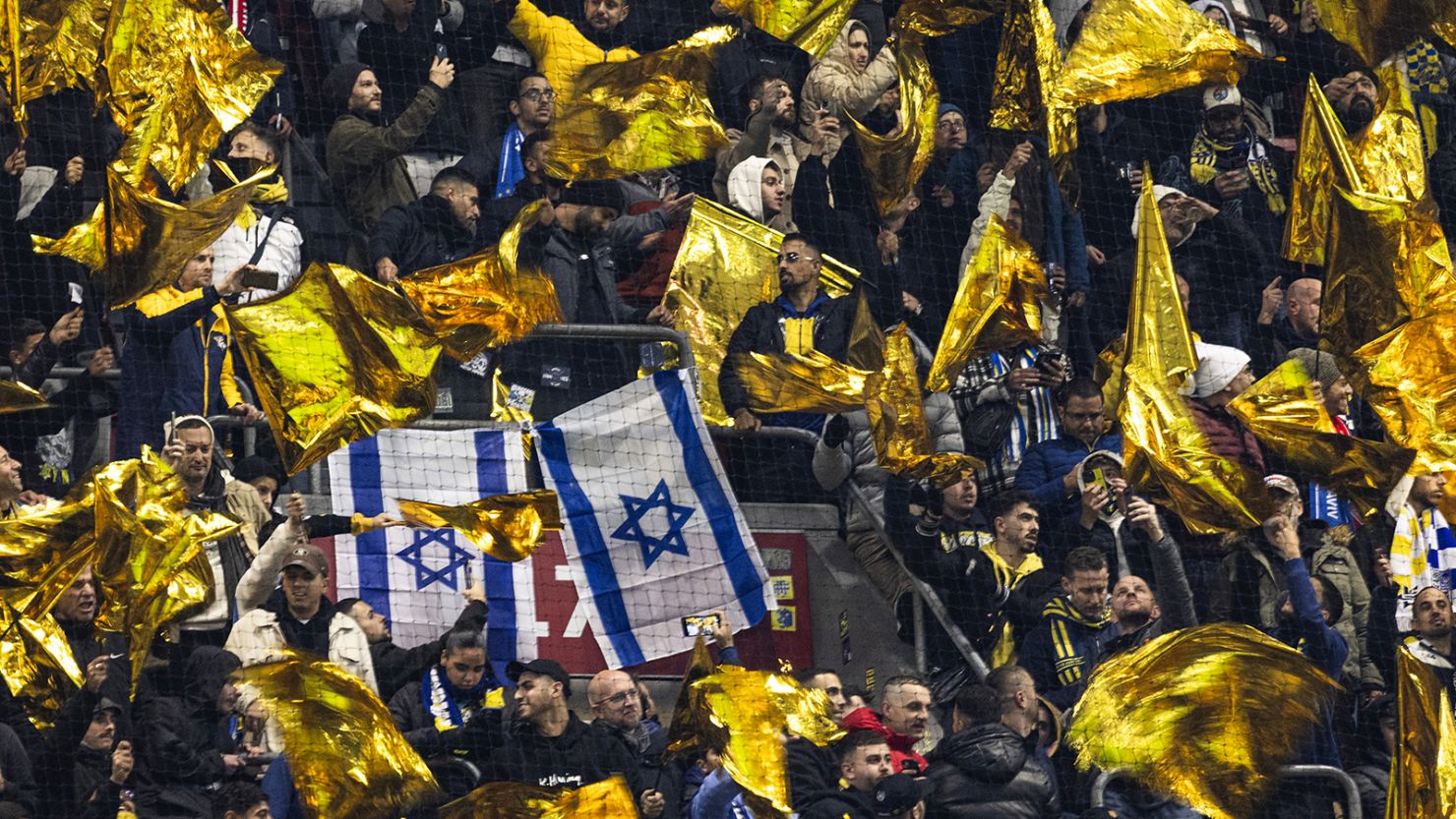- Amsterdam imposed a temporary ban on demonstrations and increased police powers following violence targeting Israeli soccer fans after a match between Maccabi Tel Aviv and Ajax Amsterdam. DW.com
- The violence included physical assaults on Israeli fans, with incidents described as “antisemitic hit-and-run attacks” and several injuries reported; 62 arrests were made, and additional security measures were enacted. TheGuardian.com
- The Dutch Prime Minister canceled his attendance at the COP29 climate summit to address the crisis, and emergency flights were organized to evacuate Israeli citizens from Amsterdam. NYTimes.com
- Reports of anti-Palestinian chanting and vandalism by Israeli fans before the match were also noted, contributing to tensions that escalated into violence. Haaretz.com
- Pro-Palestinian protesters were arrested after defying the protest ban; organizers criticized the ban, claiming it restricted Palestinian solidarity. AlJazeera.com
Many view the attacks as a resurgence of antisemitic violence, with Israeli soccer fans facing physical assaults, vandalism, and harassment in Amsterdam. The violence, which injured several fans and led to mass arrests, is seen as particularly troubling given its timing near the anniversary of Kristallnacht. Supporters of this perspective believe that the response by Amsterdam’s authorities to limit demonstrations was necessary to prevent further violence and protect vulnerable groups, especially given the heightened tensions and potential for escalation.
From this viewpoint, the ban on demonstrations and arrests of pro-Palestinian protesters represent a restriction on free expression, particularly for those opposing Israel's policies in Gaza and advocating for Palestinian rights. Organizers argue that labeling the demonstrations as antisemitic weaponizes the term to stifle legitimate protest against Israeli actions in Palestine. They see the event as an example of political repression that unfairly frames Palestinian solidarity as antisemitic, undermining the right to protest and speak out on international conflicts.
Some criticize Amsterdam’s handling of the event, suggesting that authorities failed to anticipate the volatility of the situation surrounding the Maccabi Tel Aviv vs Ajax match. Despite deploying hundreds of police, the swift escalation into violence points to an underestimation of social tensions and the influence of online organizing among extremist groups. This perspective sees the incident as highlighting gaps in law enforcement’s ability to prevent hate-motivated attacks and stresses the need for a more robust response to curb violence in high-stakes, international contexts.
Details
Security
Bias
Deltas
Amsterdam recently became the center of intense tension after an incident involving fans of the Israeli soccer team Maccabi Tel Aviv, who faced violent encounters and attacks during their visit for a match against Dutch team Ajax. The violence occurred on Thursday night, leading authorities to temporarily ban demonstrations over the weekend and grant police additional powers for security purposes. The incidents included reported “antisemitic hit-and-run attacks” on Israeli fans by groups described by Mayor Femke Halsema as “boys on scooters” TheGuardian.com DW.com. The confrontation resulted in injuries to Israeli fans, some of whom required hospitalization, while the police detained 62 people for their involvement. Several detainees faced charges of public disorder or were fined and released, with four suspects remaining in custody for violent conductTheGuardian.com.
The violence was reportedly preceded by heightened tensions and isolated incidents earlier in the week, when Israeli fans allegedly vandalized a taxi and burned a Palestinian flag, which contributed to the city’s charged atmosphere. According to sources, police had implemented enhanced security measures, such as prohibiting demonstrations near the stadium and deploying additional officers to manage crowd controlNYTimes.com. The Dutch Prime Minister, Dick Schoof, later condemned the violence and announced the cancellation of his planned trip to the COP29 climate summit, emphasizing the need to remain in the Netherlands to address the aftermath of the incidentDW.com. A court upheld the decision to ban demonstrations through Monday morning, with the Amsterdam District Court citing the continued need for heightened security and public order in light of recent violenceAlJazeera.com.
The incident has led to debates on both sides, with pro-Palestinian demonstrators criticizing the demonstration ban as a suppression of their right to protest. Organizers accused the authorities of labeling their actions as antisemitic to undermine Palestinian solidarity efforts, further stating that their protests are aimed at expressing opposition to Israel’s policies rather than targeting Jewish peopleAlJazeera.com. Despite the prohibition, hundreds of demonstrators gathered on Sunday at Amsterdam’s Dam Square, calling for an end to violence in Gaza and displaying pro-Palestinian slogans. The protest, while largely peaceful, was met with police action to disperse participantsAlJazeera.com.
Meanwhile, the Jewish community and Israeli visitors voiced concerns over the incidents, viewing the violence as part of a broader pattern of antisemitic actions. Several fans were aided by local Jewish networks, with organizations like Chabad providing assistance in securing transportation and food. Some Israeli fans chose not to use local taxis due to reports that drivers might lead them into areas where further attacks awaited themJPost.com. The Dutch police reported discovering “Free Palestine” stickers with razor blades hidden underneath, a tactic aimed at injuring those who attempt to remove them, further fueling concerns about safety and escalationJPost.com.
Authorities are now conducting a broad investigation into the violence, with Amsterdam’s police chief acknowledging that despite the large deployment, they were unable to prevent the incidents. Social media played a significant role in organizing the attacks, with some Telegram groups reportedly sharing instructions on targeting Jewish individuals. The city’s history with antisemitism during World War II was noted in the context of recent tensions, particularly as the incident took place just days before the anniversary of KristallnachtNYTimes.com. Both Dutch and Israeli governments are now working to collect testimonies and evidence from Israeli citizens to assist with prosecution efforts, underscoring the gravity of the situation and Amsterdam’s commitment to addressing the unrestJPost.com.
The article takes a negative view of the current violence, highlighted through Netanyahu's statements equating the attacks to Kristallnacht and underscoring repeated persecution of Jews in Europe. By focusing on a historical context of anti-Semitism and framing it as a severe threat, it suggests a critical stance toward the incident in Amsterdam.
Read full article
The article quotes a Holocaust survivor who draws direct comparisons to Kristallnacht, presenting the violence as part of a longer narrative of anti-Semitic persecution. This personal reflection implies a critical stance toward the recurrence of such violence in Europe.
Read full article

The article draws comparisons to historical anti-Semitic violence, aligning with Macron’s statement condemning the attacks as reminiscent of ‘darkest moments in history’. This perspective highlights a critical view of the violence’s severity, emphasizing the resurgence of anti-Semitism.
Read full article
The report highlights historical tensions and positions the violence as part of a recurring cycle of anti-Semitic sentiment, drawing parallels to broader conflicts and reinforcing a critical view of the incident’s implications.
Read full article
The article describes pro-Palestinian demonstrators targeting Israeli fans and links the incidents to ongoing regional tensions, focusing on anti-Israel perspectives highlighted by both slogans and violent confrontations.
Read full article
Negative
Sentiment

The article presents the UN Secretary-General’s condemnation without editorializing, keeping the report factual by citing specific incidents and injuries. This approach maintains an objective tone, focusing solely on reporting the official condemnation without further commentary.
Read full article
The article reports on the Amsterdam rally’s background, detentions, and both Dutch and Israeli official responses. By providing a description of events and official statements, it avoids taking a stance, emphasizing the factual timeline and responses.
Read full article

The report outlines the incidents and subsequent arrests, mentions the market response led by Bill Ackman, and discusses increased security in Amsterdam. It remains factual, emphasizing the economic impact without explicitly taking a stance on the violence or its causes.
Read full article

The article discusses rising anti-Semitic incidents across Europe, as noted by Amsterdam authorities, and conveys a summary of the situation without additional commentary, maintaining an objective tone.
Read full article

The article primarily reports on evacuation logistics and the Dutch response, including increased police security. It provides a detailed account of practical measures taken, without delving into editorial bias.
Read full article

The article focuses on violent incidents targeting Maccabi fans by Dutch individuals, providing a straightforward account of events and police involvement without taking a clear stance on the issue.
Read full article
Neutral
Sentiment
The article features strong statements from European officials condemning anti-Semitism, emphasizing Europe’s resolve to combat hate. This emphasis suggests a supportive view toward Israel by framing Europe’s commitment as a defense against anti-Semitic acts.
Read full article
Positive
Sentiment
-
+
Stmegi [Russia] Adds Historical Comparisons to Kristallnacht
Stmegi includes Netanyahu’s comparison of recent violence to Kristallnacht, emphasizing anti-Semitic implications.
This historical context was not included in Western articles. -
+
RT [Russia] Adds UN Condemnation of Anti-Semitic Violence
RT highlights UN Secretary-General’s condemnation of the attacks on Maccabi fans in Amsterdam, including remarks on anti-Semitism.
This focus on the UN’s specific statements was less emphasized in Western reports. -
+
Kommersant [Russia] Adds Information on Rally Detentions in Amsterdam
Kommersant provides details on arrests during a pro-Palestine rally in Amsterdam, following the violence against Israeli fans.
This detail on local police actions during protests was not included in Western reports. -
+
Alhurra [Middle East] Adds Cultural and Regional Dynamics of Violence
Alhurra highlights that attackers reportedly spoke in Moroccan dialects and Dutch, connecting the violence to cultural tensions.
This focus on linguistic and cultural backgrounds was not covered in Western articles. -
+
Baidu [China] Adds Economic Impact of Violence
Baidu includes statements from investors threatening to delist from Dutch exchanges due to perceived lack of safety for Israelis.
Western media generally did not cover the economic ramifications described in Chinese sources.
-
-
CNN [USA] Omits Details on Dutch Protest Reactions
CNN omits details about the cultural backgrounds and motivations of the attackers.
While focusing on violence against Israelis, it avoids attributing actions to specific cultural groups, unlike Middle Eastern sources. -
-
The Guardian [UK] Omits Police Actions Against Pro-Palestine Rally
The Guardian does not mention Amsterdam police interventions at a pro-Palestine rally near the Ajax stadium.
Reports in Russian media included this detail, while Western sources omitted it. -
-
Baidu [China] Omits Israeli Government's Direct Actions
Baidu omits details of Israel’s proposed rescue operations, focusing instead on evacuation logistics.
Western sources covered Israel's proposed military response more prominently. -
-
i24 News [Middle East] Omits Condemnation by European Leaders
i24 News does not highlight statements by European leaders condemning anti-Semitic attacks.
Western sources widely reported these official condemnations, while some Middle Eastern outlets did not. -
-
Xinhua News [China] Omits Local Reactions in Amsterdam
Xinhua does not cover the reactions of Amsterdam’s residents and local Jewish community leaders.
Western articles often included local public reactions, which Chinese media sources omitted.


